Related Research Articles

The Bee Gees were a musical group formed in 1958 by brothers Barry, Robin, and Maurice Gibb. The trio were especially successful in popular music in the late 1960s and early 1970s, and later as prominent performers in the disco music era in the mid-to-late 1970s. The group sang recognisable three-part tight harmonies: Robin's clear vibrato lead vocals were a hallmark of their earlier hits, while Barry's R&B falsetto became their signature sound during the mid-to-late 1970s and 1980s. The group wrote all their own original material, as well as writing and producing several major hits for other artists, and are regarded as one of the most important and influential acts in pop-music history. They have been referred to in the media as The Disco Kings, Britain's First Family of Harmony, and The Kings of Dance Music.

Sir Barry Alan Crompton Gibb is a British musician, singer, songwriter and record producer. Along with his younger twin brothers, Robin and Maurice, he rose to worldwide fame as a member of the Bee Gees, one of the most commercially successful groups in the history of popular music. Gibb is well known for his wide vocal range including a far-reaching high-pitched falsetto. Gibb's career has spanned over 60 years.
Cheryl Lau Sang, known professionally as Samantha Sang, is an Australian singer. She had an earlier career as a teenage singer under the stage name Cheryl Gray, before adopting the stage name she is more widely known as in 1969. She first received nationwide recognition in Australia in 1967, after releasing the top ten single "You Made Me What I Am".

Best of Bee Gees is a 1969 compilation album by the English-Australian rock band Bee Gees. It was their first international greatest hits album. It featured their singles from 1966–1969 with the exception of the band's 1968 single "Jumbo".

"Islands in the Stream" is a song written by the Bee Gees and recorded by American country music artists Kenny Rogers and Dolly Parton. It was released in August 1983 as the first single from Rogers's fifteenth studio album Eyes That See in the Dark. The Bee Gees released a live version in 1998 and a studio version in 2001.
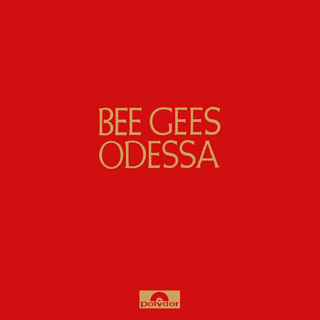
Odessa is the sixth studio album by the Bee Gees, a double vinyl LP released in February 1969, initially in an opulent red flocked cover with gold lettering. Despite reaching the UK Top Ten and the US Top 20, the album was not particularly well-received, though now is regarded by many as the most significant of the group's Sixties albums. An ambitious project, originally intended as a concept album on the loss of a fictional ship in 1899, it created tension and disagreements in the band regarding the work's direction; finally, a dispute over which song to release as a single led to Robin Gibb temporarily leaving the group.

"Night Fever" is a song written and performed by the Bee Gees. It first appeared on the soundtrack to Saturday Night Fever on RSO Records. Producer Robert Stigwood wanted to call the film Saturday Night, but singer Robin Gibb expressed hesitation at the title. Stigwood liked the title Night Fever but was wary of marketing a movie with that name. The song bounded up the Billboard charts while the Bee Gees’ two previous hits from Saturday Night Fever soundtrack were still in the top ten. The record debuted on the Billboard Hot 100 Chart at #76, then leaped up 44 positions to #32. It then moved: 32–17–8–5–2–1. It remained at #1 for eight weeks, and ultimately spent 13 weeks in the top 10. For the first five weeks that "Night Fever" was at #1, "Stayin' Alive" was at #2. Also, for one week in March, Bee Gees related songs held five of the top positions on the Hot 100 chart, and four of the top five positions, with "Night Fever" at the top of the list. The B-side of "Night Fever" was a live version of "Down the Road" taken from the Bee Gees 1977 album, Here at Last... Bee Gees... Live.

Vincent Melouney is an Australian musician. He is best known as an official member of the Bee Gees from 1967 to 1969 during the group's initial period of worldwide success.

The Marbles were an English rock duo that consisted of Graham Bonnet and Trevor Gordon, who operated between 1968 and 1969. Their only well-known singles were "Only One Woman" and "The Walls Fell Down". They also became associated with the Bee Gees members Barry, Robin and Maurice Gibb at that time.
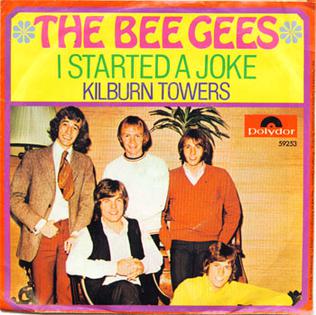
"I Started a Joke" is a song by the Bee Gees from their 1968 album Idea, which was released as a single in December of that year. It was not released as a single in the United Kingdom, where buyers who could not afford the album had to content themselves with a Polydor version by Heath Hampstead. This is the last Bee Gees single to feature Vince Melouney's guitar work, as he left the band in early December after this song was released as a single.
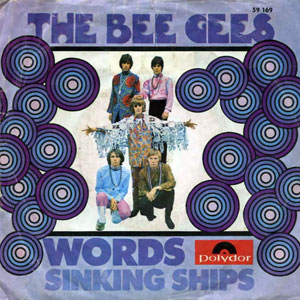
"Words" is a song by the Bee Gees, written by Barry, Robin, and Maurice Gibb. The song reached No. 1 in Germany, Canada, Switzerland and the Netherlands.
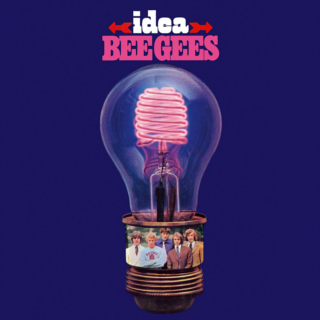
Idea is the fifth album by the Bee Gees. Released in August 1968, the album sold over a million copies worldwide. The album was issued in both mono and stereo pressings in the UK. The artwork on the Polydor release designed by Wolfgang Heilemann featured a "beehive" neon lightbulb with a group photo in its base, while the North American ATCO release designed by Klaus Voormann featured a composite head made from each band member. It was their third internationally released album – the first two albums being released only in the Australian market.
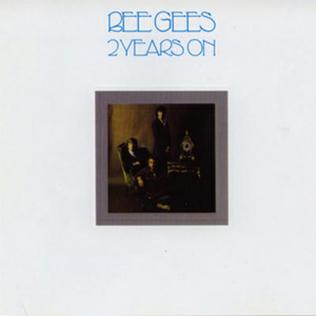
2 Years On is the eighth studio album by the Bee Gees, which reached No. 32 on the US charts. Released in 1970, the album saw the return of Robin Gibb to the group after an earlier disagreement and subsequent split following Odessa. 2 Years On was the first album with drummer Geoff Bridgford, who remained a full-time member of the group until 1972 although he was not pictured on the sleeve. The best-known track is "Lonely Days". Released as the first single by the reunited brothers, it charted high in the US, but only reached No. 33 in the United Kingdom.
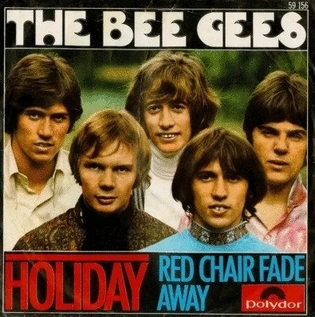
"Holiday" is a song released by the Bee Gees in the United States in September 1967. It appeared on the album Bee Gees' 1st. The song was not released as a single in their native United Kingdom because Polydor UK released the single "World" from their next album Horizontal.

"This Is Where I Came In" is the final single by the Bee Gees, released on 26 March 2001 as the only single from their last album of the same name. The song was written by Barry, Robin and Maurice Gibb. Lead vocals were performed by Robin Gibb on the first verse and on the chorus, while Barry Gibb sang lead on the second verse and sings harmony on the chorus.
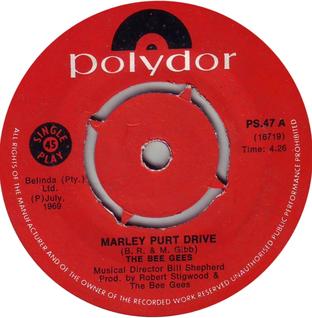
"Marley Purt Drive" is a song recorded by the Bee Gees, It was written by Barry, Robin & Maurice Gibb and released in March 1969 on the album Odessa. It was released in stereo in the United States in January and its mono version was released in the United Kingdom in March. The remastered version of this song was released on 27 February 2009 on Reprise Records.
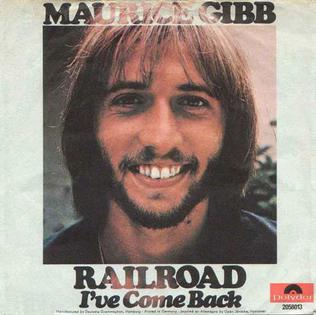
"Railroad" is the first solo single released by Maurice Gibb, best known as a member of the Bee Gees. It was released in April 1970. Like the Bee Gees' songs from 1967 to 1972, the single was released by Polydor in most parts of the world while in the US and Canada it was released by Atco. In Canada it was also released by Atlantic and Cotillion. Gibb did not release a follow-up single until 1984 when he released "Hold Her in Your Hand".

Trevor Gordon Grunnill was a British-Australian singer, songwriter and musician. He was one half of the late-1960s musical duo the Marbles, along with Graham Bonnet, whose biggest hit was the UK No. 5 charting track "Only One Woman", and their minor UK hit "The Walls Fell Down".
"Treacle Brown" is a song written and produced by Barry Gibb, Robin Gibb and Maurice Gibb and was performed by Australian singer Lori Balmer. It was only released in the United Kingdom on Polydor Records.
"Who's Been Writing on the Wall Again" is a song written by Barry Gibb in 1965. It was first recorded by Jenny Bradley and was released in 1965 on Leedon Records.
References
- 1 2 3 Kimball, Duncan (2002). "Record Labels – RCA Records". Milesago: Australasian Music and Popular Culture 1964–1975. Ice Productions. Archived from the original on 14 March 2010. Retrieved 17 August 2018.
- 1 2 3 4 "Lori Balmer". RareCollections. ABC Radio National (Australian Broadcasting Corporation (ABC)). 23 March 2014. Archived from the original on 2 July 2014. Retrieved 17 August 2018.
- 1 2 3 4 5 6 Bilyeu, Melinda; Cook, Hector; Hughes, Andrew Môn (2011). The Ultimate Biography of the Bee Gees: Tales of the Brothers Gibb. Omnibus Press. ISBN 978-0-85712-894-2 . Retrieved 17 August 2018.
those fortunate enough to have heard both songs have been able to establish that the powerful voice belongs to an 11 year old, and not a teenager as had previously been suspected.
- 1 2 Balmer, Lori; Gibb, Barry; Gibb, Maurice; Gibb, Robin (1968). "'Treacle Brown': 'Four Faces West'". England: Polydor . Retrieved 17 August 2018.
- ↑ Brennan, Joseph. "Gibb Songs: 1968". Columbia University. Archived from the original on 3 January 2007. Retrieved 17 August 2018.
- ↑ Harris, Paul (1993), "Melvin: Son of Alvin" , in Murray, Scott; Caputo, Raffaele (eds.), Australian Film 1978-1992: a Survey of Theatrical Features, Oxford University Press. Australian Film Commission. Cinema papers, p. 148, ISBN 978-0-19-553584-6
- ↑ Kent, David (1993). Australian Chart Book 1970–1992 . St Ives, NSW: Australian Chart Book Ltd. ISBN 0-646-11917-6. Note: Used for Australian Singles and Albums charting from 1974 until Australian Recording Industry Association (ARIA) created their own charts in mid-1988. In 1992, Kent back calculated chart positions for 1970–1974.
- ↑ "Bubbling Down Under Week Commencing 21 October 1991". Bubbling Down Under. Retrieved 24 October 2022.